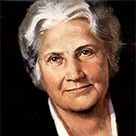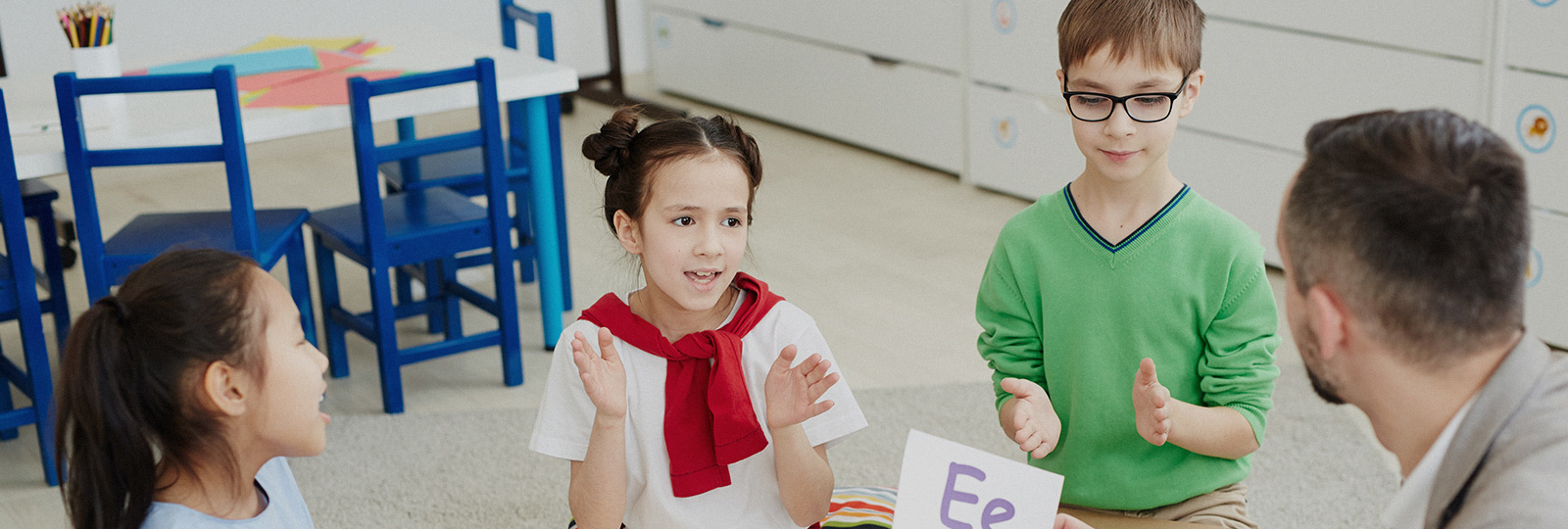
„Education should never again be primarily a transmission of knowledge,
but it must take on a new form, seeking to free itself for human possibilities.”
Maria Montessori
The Elementary lessons and materials are multi-sensory, dramatic, and impressionistic, serving to ignite the imagination and curiosity of the students.
Elementary Curriculum
The spiral curriculum of the Montessori Elementary program exposes students to many interrelated topics repeatedly over six years. With each repetition, children build on the knowledge they have about a topic, delving deeper into the details, seeing the connections more clearly, and ultimately developing a deep understanding of our complex world. The core of the Montessori Elementary curriculum is known as “Cosmic Education” and includes profound lessons, such as the origin of the universe, life on Earth, the emergence of humans, and the development of math and writing.
In their sixth year, Elementary students embark on a year-long activity known as Senior Project. Here, they integrate the research skills that they have acquired throughout their Elementary years. Students first write a research paper on a topic of personal interest and then give a presentation on that topic to the school community.
TWO THREE-YEAR CYCLES
The Elementary program is for students from 6 to 12 years old and is organized into two three-year cycles: Lower Elementary for 6 to 9 year olds and Upper Elementary for 9 to 12 year olds. As in the Primary classes, students spend all three years in the same classroom, building community with one another and deepening relationships with teachers. Elementary-aged children continue to learn through the use of concrete materials as they move gradually toward increasingly abstract thinking. The Elementary lessons and materials are multi-sensory, dramatic, and impressionistic, serving to ignite the imagination and curiosity of the students.
Language
Language and literacy for both communication and pleasure are key components of the Elementary curriculum. Students are encouraged to pursue their reading interests and to diversify their reading territories by means of guided, shared, and independent reading, as well as teacher read-alouds. Reading groups meet regularly, offering students the opportunity to practice reading for both comprehension and fluency. Through discussions, students expand vocabulary and develop strategies for inferring, analysis, and responding to interpretive questions. These conversations allow students to practice supporting their opinions with evidence from the text and to share and appreciate different perspectives.
Math
Elementary students continue to use concrete, multi-sensory Montessori materials to develop number sense and computational skills. Hands-on work, using a clear and reliable coding system enables students to explore increasingly complex math concepts. Through practice and articulation of problem and process, they construct solid math reasoning skills and become confident problem-solvers. Over the six years in Elementary, students also navigate a rich hands-on geometry curriculum, which begins with a study of nomenclature and shape and evolves into an application of mathematical skills to measure size--perimeter, area and volume.
Science - Biology
For Lower Elementary students, the focus of science is on living systems. They begin their study by observing live plants and animals to notice their external parts and body functions. Using a question and answer research format, they discover similarities and differences among animals and plant species. This leads them to understand how scientists have grouped related species within the kingdom of life. Students focus on the five classes of vertebrates and the invertebrate phyla, as well as the plant kingdom. Through these studies, students refine their understanding of a life cycle and investigate how environmental alterations affect living systems. In addition to a more in-depth study of plant and animal physiology, Upper Elementary students study microbiology and human biology and health.
History
Elementary students, armed with great imaginations and deep curiosity, are excellent time travelers. They enjoy the “great lessons,” which invite them to contemplate long ago events: the birth of the Universe, the formation of the planet Earth, the coming of life, the origin of writing, and the history of numbers. The tools they need to build a timeline of human history are presented early and nurtured throughout the Elementary years. Using a variety of clocks, timelines and matrices, students learn how to organize events over big and small lengths of time. As an introduction to history research, students use a fundamental human needs framework to learn how all people, both ancient and modern, have met their physical and spiritual needs. This allows students to recognize the unifying traits of humans of all places and all times, while also appreciating their rich cultural differences.
Geography & Technology
Elementary students are naturally keen to develop a geographic perspective and explore their place on the planet. They use a series of physical, political, and biome maps to strengthen knowledge of natural and manmade geography, as well as to chart trends in population and migration. The study of resources begins with an examination of the crucial role of agriculture. Through role play, creation of product maps and study of products, students learn how the things around them are a result of cooperation and agreement among people and the elements. Older students look critically at the distribution of resources around the world, global trade, and how economics impacts the way people live and work.
Library
Lower Elementary students have basic library orientation sessions followed by frequent opportunities to visit the library to find materials for their classroom research and independent reading. Third graders work specifically with library skills, including the library structure and research skills. The Lower Elementary classrooms each have two desktop computers and two Chromebooks. Students demonstrate beginning steps in using available hardware and applications, and they use various age-appropriate technologies to locate, collect, and organize information.
Upper Elementary students engage in more advanced library skills work, especially in the context of research. An emphasis is also placed on continued development of personal reading interests, both fiction and non-fiction. Students have increasing access to computers from fourth through sixth grade as the develop increasing independence in their range of studies, culminating in their Senior Project, a capstone research and presentation experience.
Peace, Grace & Courtesy, Service Learning
The peaceful resolution of conflicts continues to be a goal in the Elementary classroom. The older the students become, the better they are able to resolve disputes on their own. Teachers are available to facilitate discussions between students, but props like a “talking stone” can aid students in resolving conflicts independently. Acting with grace and courtesy toward others is modeled by the adults, and courteous behavior and consideration for others is expected of Elementary students. Children can help one another remember to use polite language and that their actions affect others. Elementary students participate in a number of community service efforts over the course of the year, including Service Afternoon in the spring when we make cards and pot plants to give to our neighbors. Students also tie-dye shirts to be used in the Boston Pride March, and pick-up trash in neighboring Danehy Park, as well as take part in a canned food drive.c
Spanish
Lower Elementary students continue their exploration of the Spanish language through topics that integrate their classroom studies and personal experiences. Greetings, expressions of courtesy, simple dialogue, playful rhymes, and songs complement their work in basic reading and writing in Spanish.
Upper Elementary students are introduced to grammar concepts, which help to expand their ability to read, write, listen, and speak in Spanish. Over the course of the year, the rich diversity of Spanish-speaking cultures is explored through authentic literary and audio-visual sources, music, and projects. Vocabulary is reinforced and expanded through word games and role play.
Music Arts
Elementary students study concepts such as beat, meter, rhythm, tempo, and pitch recognition and develop the ability to listen to, discover, and understand rhythmic and harmonic elements. Second- and Third-Year students practice the recorder in addition to their Music class. Students regularly demonstrate their performance skills for the entire school community at Community Meeting and the Elementary Spring Concert.
Physical Education
Cooperative games, teamwork, movement, and athletic skills are the pillars of the Physical Education program. Each child has an opportunity to grow and excel as an individual and a member of a group through a variety of games and athletic activities during regular Physical Education classes. The wintertime brings “Ski School” to the Elementary Program, and students participate in group skiing or snowboarding lessons at a nearby skiing area. In addition, a variety of athletic clubs are offered after school for students.
Theater Arts
At all three levels, Theater Arts classes enable students to discover their unique voices in the exploration of theatrical imagination. Each group addresses skills that develop creativity, personal expression, problem solving, self-direction, memory improvement, multisensory awareness, team building, and performance. Theater exercises, improvisations and scripts devised by the teacher are adapted as lessons and help students gain confidence and foster their social and emotional awareness.
Lower Elementary meets once a week as an entire class. Students practice theater games, learn songs and act out stories based on fairy tales and children’s literature.
Upper Elementary meets once a week as an entire class. Students develop acting skills through more advanced theater exercises, improvisations, and text.
Field Trips
At CMS, we see the outside world as an extension of the classroom. We take full advantage of all the unique opportunities available in Cambridge and Boston! Elementary students enjoy a variety of off-campus experiences, traveling to places such as the Harvard Peabody Museum and the New England Aquarium. Overnight camping trips are a wonderful Elementary tradition and provide a unique opportunity for children to learn about nature, practice independence, and bond with one another. Older children act as mentors and leaders for younger children and help build and strengthen a sense of community.
Homework
There's no homework at Montessori School. All the elements of the child's work: cognition, practice and checking messages takes place on the premises of the primary school. Although the school day has a slightly different layout, at 4 p.m. the student goes home and can truly rest, just as we rest after finishing our work. We believe in the principle that the place for professional teaching and learning is at school. A child must have time for carefree rest and simply to enjoy the childhood. With age, the demands increase. However, the school never delegates to parents the duty of teaching, translating or "wandering" over lessons. A child taught by us to work independently at home will carry out various projects, analyses and reflections in various fields. This work will be creative in nature and will provoke the child to immerse himself/herself in the issues he/ she learns in primary school.


